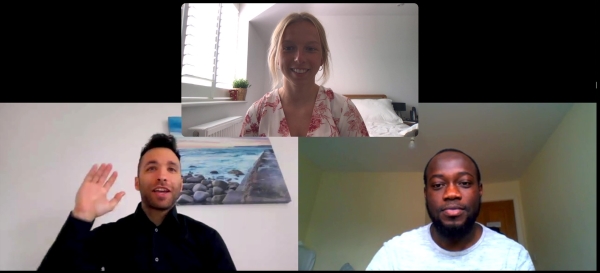PGRs helping mental health of micro-businesses
At the start of 2020, before we knew how Coronavirus was going to impact us all, several Postgraduate Researchers signed up to take part in the Virtual Consultancy Challenge. Fortunately this had already been designed and created as a completely online self-access training course and had been successfully piloted in 2019.
The researchers, who were based not only in the Midlands but in several different countries, worked in inter-disciplinary virtual teams and tried to solve their “client’s” challenge. They participated in online training in teamwork, project management, creative problem solving, pitching and career impact and attended a webinar with their client.
This year the client was Centre for Mental Health, a charity that provide research, economic analysis and policy influence in the areas of mental health, wellbeing and inequality. Centre for Mental Health had set a challenge brief focusing on how to support the mental health of micro-businesses (businesses with up to 10 employees). Little did they know how topical this would be in a post-Coronavirus locked-down world.
After months of research, ideation and discussion the teams of researchers, aka consultants, recorded and submitted a video pitching their solution. These were rigorously judged by their client, Centre for Mental Health, a solicitor at Mills & Reeve who specialises in health and care and an academic from the University of Birmingham’s Institute for Mental Health. There were some excellent innovative ideas and wonderful video creations, but there can only be one winner. The decision was unanimous – team Bloom were awarded first place.
Bloom comprises Francesca Lewns, PhD Dentistry, Paris Lalousis, PhD Psychology and Taiwo Hassan Akere, PhD Earth & Environmental Sciences. Congratulations to them! Centre for Mental Health are planning to publish Bloom’s work - they and Bloom are keen to make it available for micro-businesses to implement.

Bloom were delighted with the win and their involvement in the programme as a whole. Francesca said
“I really enjoyed the Virtual Consultancy Challenge because it allowed me to network and create connections with other postgraduate students that I would never usually connect with.
It’s very different from anything I’ve ever done before and was really nice to have a focus other than my PhD research, I felt as though it was a break from my work whilst also continuing further professional development.
I particularly liked that it was a real life situation - not made up for the purpose of the task - and so the end result was sent to actual clients.”
Paris felt similarly,
“Taking part in the Virtual Consultancy Challenge was an experience that helped me gain skills in a setting that is different from that of my PhD and also gave me the chance to meet people from different disciplines.
The process was hard but also rewarding and provided me with stimulation outside of my research. The fact that it was a project that involved a real problem and real clients made it all the more exciting.
Finding out that our team won the challenge definitely made my day and showed me that the skills I am gaining from my PhD can be put to use also outside of academia.”
And Hassan added
“I had a wonderful experience participating in the Virtual Consultancy Challenge. The issue concerns me on a personal level as an employer and as a relative and friend to people who have been affected. It's absolutely exciting and reassuring to learn that the judges found our proposed solution to be the best.”
To find out more about similar opportunities run by the PGR Entrepreneurial Development Officer visit the PGR Enterprise & Employability webpage or email Katie Hoare (k.hoare@bham.ac.uk).